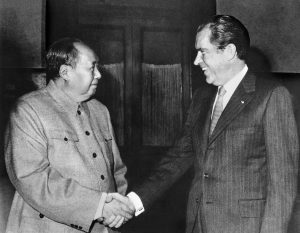Index relies entirely on the support of donors and readers to do its work.
Help us keep amplifying censored voices today.
[vc_row][vc_column][vc_column_text]

The first issue of Index on Censorship magazine, in March 1972.
You may have heard that the 70s were different. In 1972, when the first issue of Index magazine was launched, no one knew that 20 years later there would be an influential economic bloc called the European Union. The Beatles’ had only just split. The World Trade Center in New York was being built, while Sir Edward Heath was the prime minister of the United Kingdom.
Fifty years on and some things remain. Queen Elizabeth’s reign goes on and celebrates its 70th anniversary in 2022. Dictatorships and censorship, which should be trapped in history books, continue to torment the lives of many. And as a result, Index on Censorship remains vigilant, defending freedom of expression and giving voice to those who are silenced.
As we celebrate our 50th anniversary, we go back in time and remember the remarkable events that happened in 1972.[/vc_column_text][vc_custom_heading text=”1″][vc_column_text]January 30th: British soldiers shoot 26 unarmed civilians during a protest in Derry, Northern Ireland. Fourteen people were killed on this day known as “Bloody Sunday”. [/vc_column_text][vc_custom_heading text=”2″][vc_column_text]February 1st: Paul McCartney and the Wings release “Give Ireland back to the Irish” in the UK. It would be banned by the BBC, nine days later. [/vc_column_text][vc_custom_heading text=”3″][vc_column_text]February 5th: Airlines in the United States begin to inspect passengers and baggage. Tough to imagine that people traveled without any surveillance. [/vc_column_text][vc_custom_heading text=”4″][vc_column_text]February 17th: British Parliament votes to join the European Common Market. In 2020, the United Kingdom would leave the European Union. [/vc_column_text][vc_custom_heading text=”5″][vc_column_text]February 21st: Richard Nixon becomes the first US president to visit China, seeking to establish positive relations in a meeting with Chinese leader Mao Zedong, in Beijing.

Mao Zedong and Richard Nixon during Nixon’s historical visit to China in 1972. Photo: Ian Dagnall/Alamy
[/vc_column_text][vc_custom_heading text=”6″][vc_column_text]March 15th: The Godfather, starring Marlon Brando and Al Pacino, premieres in New York. It wins Best Picture and Best Actor (Brando) at the 45th Academy Awards.

Al Pacino and Marlon Brando in the Godfather. The first film of one the most successful franchises of all time was released in 1972. Photo: All Star Library/Alamy
[/vc_column_text][vc_custom_heading text=”7″][vc_column_text]June 18th: British European Airways Trident crashes after takeoff from Heathrow to Brussels, killing all 118 people on board. [/vc_column_text][vc_custom_heading text=”8″][vc_column_text]July 1st: Feminist magazine Ms, founded by Gloria Steinem, publishes its first issue, with Wonder Woman on the cover.[/vc_column_text][vc_custom_heading text=”9″][vc_column_text]August 4th: Uganda dictator Idi Amin orders the expulsion of 50,000 Asians with British passports.
[/vc_column_text][vc_custom_heading text=”10″][vc_column_text]September 4th and 5th: 11 members of the Israeli Olympic team are murdered by a Palestinian terrorist group in the second week of the 1972 Olympics in Munich.[/vc_column_text][vc_custom_heading text=”11″][vc_column_text]September 21st: Philippines President Ferdinand Marcos declares martial law. In 2022, his son Ferdinand ‘Bongbong’ Marcos is running for president. [/vc_column_text][vc_custom_heading text=”12″][vc_column_text]October 13th: A flight from Uruguay to Chile crashes in the Andes Mountains. Passengers eat the flesh of the deceased to survive. Sixteen people are rescued two months later.[/vc_column_text][vc_custom_heading text=”13″][vc_column_text]November 30th: BBC bans “Hi, Hi, Hi”, by Paul McCartney and The Wings, due to its drug references and suggestive sexual content. [/vc_column_text][vc_custom_heading text=”14″][vc_column_text]December 7th: Apollo 17 is launched and the crew takes the famous “blue marble” photo of the entire Earth.

The earth seen from the Apollo 17 spacecraft. Photo: NASA/Alamy
[/vc_column_text][vc_custom_heading text=”15″][vc_column_text]December 28th: Kim Il-Sung takes over as president of North Korea. He’s the grandfather of the country’s current leader, Kim Jong-un. [/vc_column_text][vc_custom_heading text=”16″][vc_column_text]December 30th: US President Richard Nixon halts bombing of North Vietnam and announces peace talks in Paris, to be held in January 1973. [/vc_column_text][/vc_column][/vc_row]
The spring issue of Index magazine is special. We are celebrating 50 years of history and to such a milestone we’ve decided to look back at the thorny path that brought us here.
Editors from our five decades of life have accepted our invitation to think over their time at Index, while we’ve chosen pieces from important moments that truly tell our diverse and abundant trajectory.
Susan McKay has revisited an article about the contentious role of the BBC in Northern Ireland published in our first issue, and compares it to today’s reality.
Martin Bright does a brilliant job and reveals fascinating details on Index origin story, which you shouldn’t miss.
Index at 50, by Jemimah Steinfeld: How Index has lived up to Stephen Spender’s founding manifesto over five decades of the magazine.
The Index: Free expression around the world today: the inspiring voices, the people who have been imprisoned and the trends, legislation and technology which are causing concern.
“Special report: Index on Censorship at 50”][vc_column_text]Dissidents, spies and the lies that came in from the cold, by Martin Bright: The story of Index’s origins is caught up in the Cold War – and as exciting
Sound and fury at BBC ‘bias’, by Susan McKay: The way Northern Ireland is reported continues to divide, 50 years on.
How do you find 50 years of censorship, by Htein Lin: The distinguished artist from Myanmar paints a canvas exclusively for our anniversary.
Humpty Dumpty has maybe had the last word, by Sir Tom Stoppard: Identity politics has thrown up a new phenonemon, an intolerance between individuals.
The article that tore Turkey apart, by Kaya Genç: Elif Shafak and Ece Temulkuran reflect on an Index article that the nation.
Of course it’s not appropriate – it’s satire, by Natasha Joseph: The Dame Edna of South Africa on beating apartheid’s censors.
The staged suicided that haunts Brazil, by Guilherme Osinski: Vladimir Herzog was murdered in 1975. Years on his family await answers – and an apology.
Greece haunted by spectre of the past, by Tony Rigopoulos: Decades after the colonels, Greece’s media is under attack.
Ugandans still wait for life to turn sweet, by Issa Sikiti da Silva: Hopes were high after Idi Amin. Then came Museveni …People in Kampala talk about their
problems with the regime.
How much distance from Mao? By Rana Mitter: The Cultural Revolution ended; censorship did not.
Climate science is still being silenced, by Margaret Atwood: The acclaimed writer on the fiercest free speech battle of the day.
God’s gift to who? By Charlie Smith: A 2006 prediction that the internet would change China for the better has come to pass.
50 tech milestones of the past 50 years, by Mark Frary: Expert voices and a long-view of the innovations that changed the free speech landscape.
Censoring the net is not the answer, but… By Vint Cerf: One of the godfathers of the internet reflects on what went right and what went wrong.[/vc_column_text][vc_custom_heading text=”Five decades in review”][vc_column_text]An arresting start, by Michael Scammell: The first editor of Index recounts being detained in Moscow.
The clockwork show: Under the Greek colonels, being out of jail didn’t mean being free.
Two letters, by Kurt Vonnegut: His books were banned and burned.
Winning friends, making enemies, influencing people, by Philip Spender: Index found its stride in the 1980s. Governments took note.
The nurse and the poet, by Karel Kyncl: An English nurse and the first Czech ‘non-person’.
Tuning in to revolution, by Jane McIntosh: In revolutionary Latin America, radio set the rules.
‘Animal can’t dash me human rights’, by Fela Kuti: Why the king of Afrobeat scared Nigeria’s regime.
Why should music be censorable, by Yehudi Menuhin: The violinist laid down his own rules – about muzak.
The snake sheds its skin, by Judith Vidal-Hall: A post-USSR world order didn’t bring desired freedoms.
Close-up of death, by Slavenka Drakulic: We said ‘never again’ but didn’t live up to it in Bosnia. Instead we just filmed it.
Bosnia on my mind, by Salman Rushdie: Did the world look away because it was Muslims?
Laughing in Rwanda, by François Vinsot: After the genocide, laughter was the tonic.
The fatwa made publishers lose their nerve, by Jo Glanville: Long after the Rushdie aff air, Index’s editor felt the pinch.
Standing alone, by Anna Politkovskaya: Chechnya by the fearless journalist later murdered.
Fortress America, by Rubén Martínez: A report from the Mexican border in a post 9/11 USA.
Stripsearch, by Martin Rowson: The thing about the Human Rights Act …
Conspiracy of silence, by Al Weiwei: Saying the devastation of the Sichuan earthquake was partly manmade was not welcome.
To better days, by Rachael Jolley: The hope that kept the light burning during her editorship.
Plays, protests and the censor’s pencil, by Simon Callow: How Shakespeare fell foul of dictators and monarchs. Plus: Katherine E McClusky.
The enemies of those people, by Nina Khrushcheva: Khrushchev’s greatgranddaughter on growing up in the Soviet Union and her fears for the US press.
We’re not scared of these things, by Miriam Grace A Go: Trouble for Philippine
journalists.
Windows on the world, by Nazanin Zaghari-Ratcliffe and Golrokh Ebrahimi Iraee: Poems from Iran by two political prisoners.
Beijing’s fearless foe with God on his side, by Jimmy Lai: Letters from prison by the Hong Kong publisher and activist.
We should not be put up for sale, by Aishwarya Jagani: Two Muslim women in India on being ‘auctioned’ online.
Cartoon, by Ben Jennings: Liberty for who?
Amin’s awful story is much more than popcorn for the eyes, by Jemimah Steinfeld: Interview with the director of Flee, a film about an Afghan refugee’s flight and exile.
Women defy gunmen in fight for justice, by Témoris Grecko: Relatives of murdered Mexican journalist in brave campaign.
Chaos censorship, by John Sweeney: Putin’s war on truth, from the Ukraine frontline.
In defence of the unreasonable, by Ziyad Marar: The reasons behind the need
to be unreasonable.
We walk a very thin line when we report ‘us and them’, by Emily Couch: Reverting to stereotypes when reporting on non-Western countries merely aids dictators.
It’s time to put down the detached watchdog, by Fréderike Geerdink: Western newsrooms are failing to hold power to account.
A light in the dark, by Trevor Philips: Index’s Chair reflects on some of the magazine’s achievements.
Our work here is far from done, by Ruth Smeeth: Our CEO says Index will carry on fighting for the next 50 years.
In vodka veritas, by Nick Harkaway and Jemimah Steinfeld: The author talks about Anya’s Bible, his new story inspired by early Index and Moscow bars.
A ghost-written tale of love, by Ariel Dorfman and Jemimah Steinfeld: The novelist tells the editor of Index about his new short story, Mumtaz, which we publish.
‘Threats will not silence me’, by Bilal Ahmad Pandow and Madhosh Balhami: A Kashmiri poet talks about his 30 years of resistance.
A classic case of cancel culture, by Marc Nash: Remember Socrates’ downfall.
First he fled Xinjiang. Then Kazakhstan. And then Turkey. On 20 January 2021 Serikzhan Bilash, a prominent human rights defender and activist, travelled alone to the United States to seek asylum. He left behind his wife, Laila Adilzahn, and three sons. On 9 January 2022, his family travelled to the Netherlands to seek asylum. But even there troubles have continued to plague them.
Since the Ürümqi protests of 2009, violent and oppressive PRC policies towards the region’s minorities have intensified to what today amounts to genocide. As a native Kazakh in the region, Bilash founded Atajurt Human Rights in 2017. Together with his wife, who is also a native Kazakh born in Almaty, the capital of Kazakhstan, they have recorded, translated and published online thousands of video testimonies of the abuses. Bilash told Index:
“I created the video testimony model because ethnic Kazakhs who lost loved ones in Xinjiang were coming to me to tell their story.”
Many Kazakh families are separated due to some members having fled the region using dual passports [Chinese and Kazakhs]. His organisation has called on the Chinese government to release interned family members, support their relatives in Kazakhstan and empower the voices of survivors.
“Too many awful stories there. We were translating these facts into English for international journalists. So it was big, big work,” Adilzahn said.
This work has not been without risks. On 10 March 2019, Bilash was arrested by the Kazakhstan authorities. He was charged with article 174 of the Criminal Code of Kazakhstan for “inciting ethnic hatred”. The UN Special Rapporteur, Fionnuala Ní Aoláin, has stated article 174 has been used unduly and increasingly to target outspoken civil society leaders to obstruct their work [paragraph 15]. Bilash told Index:
“I never criticised the Kazakhstan government when beginning this work because I knew if I criticised, it would be very dangerous to continue. So collecting the facts about the concentration camps and sending it to the media was the only way to save my people.”
He told survivors the Kazakh government would support them, but instead “because of Chinese pressure, the Kazakhstan government arrested me.”
“Please Save My Husband”, Adilzahn wrote to the international community via her Bitter Winter blog.
Bilash spent six months in prison and under house arrest, before coming to a procedural agreement allowing for his release. The conditions were that he had to plead guilty and promise to refrain from leading a political organisation for the next seven years.
Throughout 2020 Kazakhstan’s human rights situation was worsening.
“When he was released we thought we could stay there in Kazakhstan, and that they couldn’t arrest us, or do something with us. But we were mistaken. They started sending papers and opening new cases against us again. There was no chance to stay,” said Adilzahn.
Bilash said he was harassed by people connected to the government. According to Bilash, it began with carrots: promises of a state fund to manage and the opportunity to “live happily ever after”. He refused, knowing his silence could not be bought. So the sticks were brought out: Bilash received death threats from Kazakh authorities: “What if a truck crashes into your car and kills you, leaving your children crying behind you.” With Dulat Agadil, a close supporter, having already died in custody and his son stabbed shortly after, it was time to leave. On 10 September 2020, they left for Turkey.
Their situation was desperate. Adilzahn told Index: “We obtained a year tourist visa. But we had nothing. We never planned to leave Kazakhstan, or get refugee status from somewhere.” Bilash said Kazahk authorities labelled him a terrorist and froze his bank accounts. When in Turkey, Bilash alleges individuals approaching him monitored his activities on behalf of the Kazakhstan state. Their feelings of insecurity were exacerbated by notable reports of Uyghurs being watched, killed and deported via third countries.
In Turkey, he felt there was no way to continue the work of Atajurt Human Rights. Adilzahn told him, “You have to go, you are the only one who can rescue your nation. If you are deported back to China, your life and nation will be lost. There will be no chance for freedom.” So on 20 January 2021, Bilash left Turkey to seek asylum in the USA. His family remained in Turkey as they didn’t have the documentation needed. Since February 2021, China Aid has been hosting and helping him with the process.
Adilzahn told Index that they “thought he had a politically motivated full case [for asylum], and that we could reunite in America very fast.” But she speculated the pandemic, a Presidential election and issues with illegal immigrants in the USA slowed down Bilash’s asylum and their reunification. This endangered the family.
“A big footprint was left on the patio outside their apartment where Adilzahn lived. And there were reports of Kazakh government security officers searching the Kazakh ex-pat community in Turkey by showing Mr. Bilash’s photo and asking where they could find his family,” Bob Fu, the founder of China Aid, told Index.
Then, in December 2021 Duken Masimkhanuli, president of a pro-Chinese organisation in Kazakhstan, texted Bilash threatening “I will kill you and your three sons.” He was also insulted and threatened by Bakhtiyar Toktaubay, a resident of the Almaty region in Kazakhstan. He sent a video saying “Serikzhan, you left your wife in Turkey and fled to the United States. If you don’t like her, we need her. If she wants me, if I like her, I will spend a night with your wife, I will sleep in your house.”
“By founding Atajurt Human Rights, we have rescued thousands from Xinjiang re-education camps. We fight at one time on two front lines. The first front line is the Chinese Communist Party, and the second is Kazakhstan National Security. I saved so many from re-education camps, but could not save my own family. The American government gave no official support,” Bilash said.
On 5 January 2022, as protesters filled the streets of Kazakhstan, authorities declared a state of emergency. Police fired on protesters. Bilash criticised the “high level [governmental] revenge and mass arrests”. With Kazakh President Tokayev threatening punishment to all involved, and with Bilash’s family still within reach, Adilzahn told Index that it was “too dangerous” to stay in Turkey.
She added: “It seemed my people were winning until the Kazakh authority invited the Russian army in. They were killing people indiscriminately. Too many innocent people dying. Now my people are queuing for the morgues, and my birth city Almaty has been destroyed.” China Aid has since published an article titled “The Xinjiang Model repeated in Kazakhstan”.
Knowing the family had to act quickly Fu developed a plan.
“They decided to send someone to help me, as I am alone. I have three little children, three boys [1, 4 and 6 years old] and luggage. I couldn’t have gone by myself,” Adilzahn told Index. This is when Michael Horowitz, former OMB General Counsel to the Reagan Administration, and his wife Dr Devra Marcus agreed to accompany the family. They have housed many CCP-persecuted individuals, including Bilash.

Michael Horowitz accompanied Laila Adilzahn and her three sons to the Netherlands. Credit: China Aid
On 9 January the six travellers boarded a flight from Istanbul with a layover in the Netherlands, where they are currently being processed as priority asylum seekers.
Despite securing the family’s safety, Horowitz and Marcus were arrested on arriving at Schiphol airport. The Royal Netherlands Marechaussee spokesperson, Mike Hofman told Index, “On Sunday 9 January 2022, we arrested two American citizens for human trafficking. It’s suspected that they accompanied and assisted a family from Kazakhstan from Turkey to the Netherlands to apply for asylum.” He continued, “The American citizens were released from custody on Tuesday, but remain suspects.” On 12 January 2022, they arrived back in the USA.
“Last year alone China Aid rescued 17 endangered people, with six being brought to the Netherlands. We have never had this problem,” said Fu.
“The accusations against Mike and Devra are bizarre and absurd.”
The US Embassy Consular Affair Chief relayed the words of Horowitz and Marcus whilst detained: “It’s one of the great honors of my wife and mine that we have been able to play a role in helping to rescue two human rights heroes […] ”We are not traffickers.”
Michael Polak, Director and Barrister of Justice Abroad, told Index: “It is clear that Serikzhan Bilash and his family have faced intense danger and persecution because of his brave stance speaking up for ethnic Kazakhs stuck in Chinese camps whilst the Kazakh government stayed silent. It is clear that the Bilash family qualify as refugees, and it is great that they are in the Netherlands where they are safe. The arrest of the American nationals is oppressive and disproportionate, and it is hoped that they will not be charged given all the circumstances.”
Today Bilash and his family are now far away from Kazakhstan and indeed China. But they do not feel completely safe. As he tells Index: “Pro-Beijing forces are indeed rampant, everywhere, and are very powerful.”
[vc_row][vc_column][vc_single_image image=”117096″ img_size=”full” add_caption=”yes”][vc_column_text]A high school cheerleader has won an important victory for the right of students to express their opinions freely while off campus.
At the end of June, the US Supreme Court ruled eight to one that the rights of high school student Brandi Levy had been violated in a case dating back to 2017.
After failing to make the varsity cheerleading team, Levy had posted profanity-laced criticisms of the team roster on Snapchat while off campus at a local convenience store. The team captain kicked her off the junior varsity cheerleading team for a year as punishment.
The Supreme Court was asked to consider whether schools had the right to regulate off-campus speech; it ruled that her posts did not disrupt school operations so Levy’s rights had been violated. The court maintained that schools have a right to regulate speech in some “school-related, off-campus activities” without defining what that would look like.
David Cole, the legal director of the ACLU, called the ruling a victory for students, saying “the message from this ruling is clear – free speech is for everyone, and that includes public school students”. The director of the Pennsylvania ACLU, which represented Levy, characterised the precedent established by the ruling, saying they successfully argued that “students have greater free speech rights out of school and on their own time.”
Despite the nature of her comments, Levy was motivated to fight for her rights. She commented publicly that she was proud to have advocated for the rights of students saying, “young people need to have the ability to express themselves without worrying about being punished when they get to school”.
Recent graduates from Blake High School in Maryland broadly agree with the principle the court ruled on – that her speech did not disrupt the safety of the school.
Cole Shankel, class of 2023, said, “She’s overreacting… cheerleading is lame,” but added, “I don’t think public schools should be allowed to punish students for off-campus speech.”
Jeniffer Ventura, class of 2021, pointed out, “Being held accountable for your actions online is important,” expressing concern about online hate speech and racism affecting the safety and security of the community. Julian Kabik, also the class of 2021, stated simply, “If you are not making a deliberate threat online, then I don’t think you should be punished.”
This is the first student free speech case to favour students since the landmark 1969 case Tinker v Demois. The case considered students who had been suspended for wearing black armbands in protest at the war in Vietnam; the court ruled schools must show a substantial disruption to school operations, besides the speech being unpleasant, to restrict a student’s right to free speech.
The right of students to exercise free speech established in the case has been eroded by others since then. In 1986, Bethel v Fraser ruled that schools could regulate certain styles of expression if they were sexually vulgar. In 1989, in Hazelwood v Kuhlmeier, the court ruled schools had the right to regulate the content of school publications. In 2007, the Supreme Court ruled in Morse v Frederick that schools may restrict speech at or in view of a school-supervised event if it promoted illegal drug use. The US Court of Appeals Fourth Circuit Court in 2013 and Ninth Circuit Court in 2014 ruled a student’s dress could be restricted in two separate cases related to wearing the confederate flag or American flag, respectively. The courts ruled student dress had incited disruption, and the Supreme Court declined to hear both cases.
The Levy ruling has broken the trend in student speech law, affirming students’ off-campus rights and considering the role of extracurricular activities for the first time. A ruling against Levy would have further crippled the original 1969 ruling, allowing schools to restrict students based on their speech being unpalatable and extending a school’s authority to restrict student speech to include online and off-campus speech.
Despite this, the Levy ruling is not a decisive victory for American students’ right to free speech.
When students are on campus, schools act in loco parentis – they function in place of parents. This gives schools legal authority over minors’ rights while they are at school and formally gives all other authority over minors to their legal guardians. This doctrine and the fact that Levy was off campus when she made the posts was at the centre of the majority opinion’s arguments. Since the Levy ruling reaffirms the school’s on-campus authority over student’s rights, this aspect can be interpreted as an opening to further restrict student speech when on campus.
In questioning, some justices raised concerns about a school’s ability to punish off-campus speech that was threatening to other students. Other justices raised concerns of what schools would do with authority over off-campus speech that was politically controversial.
The justices’ questions indicate that they feel the issue of off-campus speech needs to be further unpacked. All but two of the justices are under the age of 70, and all three of former President Donald Trump’s appointments are under the age of 60. With the composition of the court being unlikely to change any time soon, the right of students to express themselves freely may yet be further eroded.[/vc_column_text][/vc_column][/vc_row][vc_row][vc_column][three_column_post title=”You may also want to read” category_id=”581″][/vc_column][/vc_row]